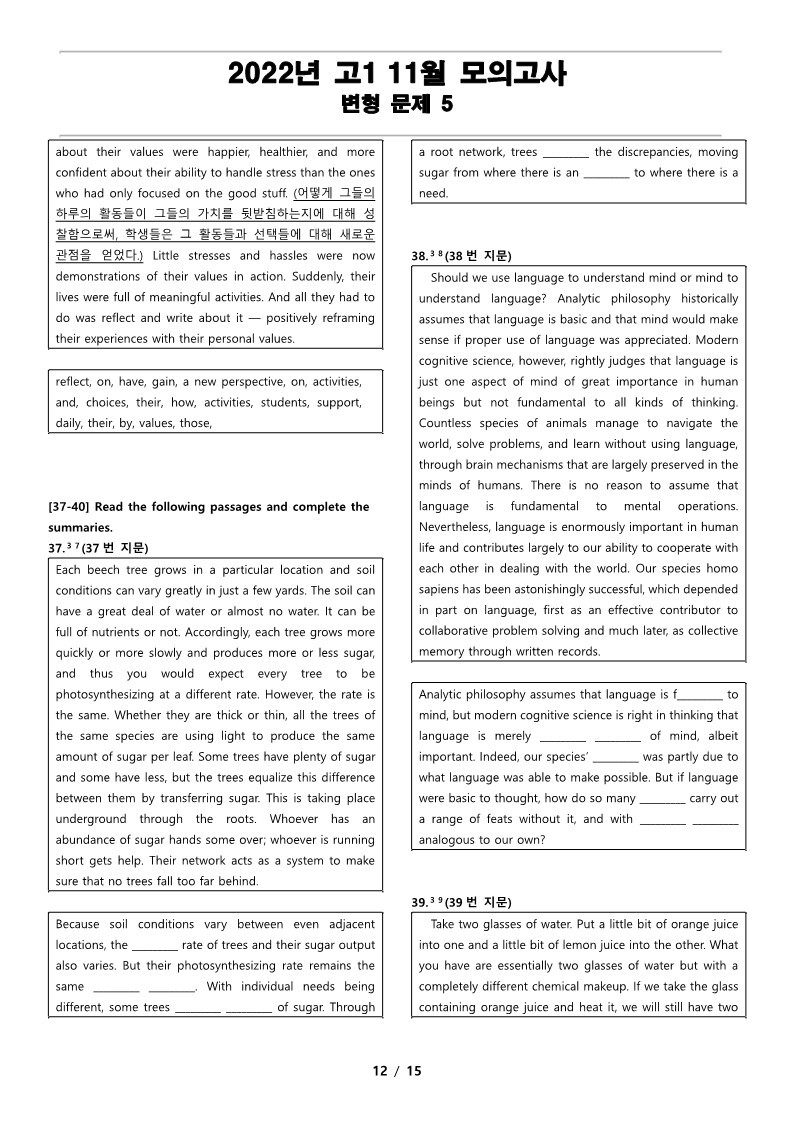2022년 고1 11월 전국 연합 모의고사
변형 문제 5
2022년 고1 11월 전국 연합 모의고사 변형 문제 5
출판사에서 오랫동안 영어 번역과 교정을 하셨던 원어민 선생님과
현직에서 강사를 하고 있는 연구진들이 학생들을 위한 최상의
2022년 고1 11월 전국 연합 모의고사 변형 문제 5 를 선보입니다.
사고력과 이해력을 요구하는 문제들로 내신 대비 뿐만이 아니라
수능도 한꺼번에 공부하실 수 있는 자료입니다.
중간고사&기말고사 전에 더메이킹스(The Makings)에서 제작한
2022년 고1 11월 전국 연합 모의고사 변형 문제로 마무리 하세요.
정답 확인 하러가기!
2022년 고1 11월 전국 연합 모의고사 변형 문제 5
2022년 고1 11월 전국 연합 모의고사 변형 문제, 내신대비, 영어내신자료,고등영어자료, 모의고사 변형문제,전국 연합모의고사 변형자료, 모의고사 영어 서술형 대비, 대치동 고등 영어자료, 대치
themakings.co.kr
themakings.co.kr
The Makings의 2022년 고1 11월 전국 연합 모의고사 변형 문제는
총 11개의 유형으로 구성되어 있습니다.
1. 빈칸 채우기(객관식)
2. 글의 내용 일치/불일치(객관식/한글 선택지)
3. 글의 내용 일치/불일치(객관식/영어 선택지)
4. 글 끼어 넣기(객관식)
5. 어법(서술형)
6. 어휘(서술형)
7. 주제문(객관식/영어 선택지)
8. 어휘 빈칸 채우기(서술형)
9. 영작(서술형)
10. 요약문 완성하기(서술형)
11. 문단 재배열 하기(객관식)
더메이킹스(The Makings)가 제작한 2022년 고1 11월 전국 연합 모의고사
변형 문제 5의 지문입니다.
1번 지문(문항 번호 37번)
Each beech tree grows in a particular location and soil conditions can vary greatly in just a few yards. The soil can have a great deal of water or almost no water. It can be full of nutrients or not. Accordingly, each tree grows more quickly or more slowly and produces more or less sugar, and thus you would expect every tree to be photosynthesizing at a different rate. However, the rate is the same. Whether they are thick or thin, all the trees of the same species are using light to produce the same amount of sugar per leaf. Some trees have plenty of sugar and some have less, but the trees equalize this difference between them by transferring sugar. This is taking place underground through the roots. Whoever has an abundance of sugar hands some over; whoever is running short gets help. Their network acts as a system to make sure that no trees fall too far behind.
2번 지문(문항 번호 38번)
Should we use language to understand mind or mind to understand language? Analytic philosophy historically assumes that language is basic and that mind would make sense if proper use of language was appreciated. Modern cognitive science, however, rightly judges that language is just one aspect of mind of great importance in human beings but not fundamental to all kinds of thinking. Countless species of animals manage to navigate the world, solve problems, and learn without using language, through brain mechanisms that are largely preserved in the minds of humans. There is no reason to assume that language is fundamental to mental operations. Nevertheless, language is enormously important in human life and contributes largely to our ability to cooperate with each other in dealing with the world. Our species homo sapiens has been astonishingly successful, which depended in part on language, first as an effective contributor to collaborative problem solving and much later, as collective memory through written records.
3번 지문(문항 번호 39번)
Take two glasses of water. Put a little bit of orange juice into one and a little bit of lemon juice into the other. What you have are essentially two glasses of water but with a completely different chemical makeup. If we take the glass containing orange juice and heat it, we will still have two different glasses of water with different chemical makeups, but now they will also have different temperatures. If we could magically remove the glasses, we would find the two water bodies would not mix well. Perhaps they would mix a little where they met; however, they would remain separate because of their different chemical makeups and temperatures. The warmer water would float on the surface of the cold water because of its lighter weight. In the ocean we have bodies of water that differ in temperature and salt content; for this reason, they do not mix.
4번 지문(문항 번호 40번)
One of the most powerful tools to find meaning in our lives is reflective journaling ― thinking back on and writing about what has happened to us. In the 1990s, Stanford University researchers asked undergraduate students on spring break to journal about their most important personal values and their daily activities; others were asked to write about only the good things that happened to them in the day. Three weeks later, the students who had written about their values were happier, healthier, and more confident about their ability to handle stress than the ones who had only focused on the good stuff. By reflecting on how their daily activities supported their values, students had gained a new perspective on those activities and choices. Little stresses and hassles were now demonstrations of their values in action. Suddenly, their lives were full of meaningful activities. And all they had to do was reflect and write about it ― positively reframing their experiences with their personal values.
'전국 연합 모의고사 변형 문제 > 고1 모의고사 변형 문제' 카테고리의 다른 글
| 2022년 고1 3월 전국 연합 모의고사 변형 문제 3 (0) | 2023.02.10 |
|---|---|
| 2022년 고1 3월 전국 연합 모의고사 변형 문제 1 (0) | 2023.02.07 |
| 2022년 고1 11월 전국 연합 모의고사 변형 문제 4 (0) | 2022.11.28 |
| 2022년 고1 11월 전국 연합 모의고사 변형 문제 3 (0) | 2022.11.27 |
| 2022년 고1 11월 전국 연합 모의고사 변형 문제 2 (0) | 2022.11.26 |

